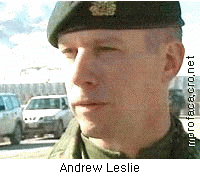
|  |
 U.S. Awards Nazi Collaborator "Legion of Merit" U.S. Awards Nazi Collaborator "Legion of Merit" |
|
| |
Case No. IT-01-45 / 24 Feb. 2004 "Operation Storm" Croat Generals On Trial At The Hague Tribunal  International Criminal Tribunal International Criminal Tribunal for Former Yugoslavia  Weekly Court Schedule Weekly Court Schedule |
| |||||||||||||||||||||||||||||||
The United States not only monitored the complete Operation Storm, but they also actively participated with the Croatian Military in its preparation, and in the end directly initiated the operation. The green light from the White House and then President Clinton for Operation Storm was passed on by Colonel Richard C. Herrick, then US military attaché in Zagreb. Several days prior to the commencement of Operation Storm, Herrick visited Markica Rebić in Zagreb. Rebić, Miroslav Tuđman, then director of HIS and Miro Međimurac, then head of SIS, held the most intensive communications with the American military and intelligence agencies. 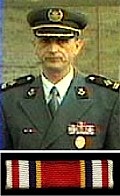 As such, in 1996, Markica Rebić was awarded the Meritorius Service Medal by Peter Galbraith, then US Ambassador to Croatia. As such, in 1996, Markica Rebić was awarded the Meritorius Service Medal by Peter Galbraith, then US Ambassador to Croatia.Herrick passed on the message that the US had no opposition to the beginning of Operation Storm, that the operation had to be 'clean and fast' and had to be completed in 5 days time. As Nacional has learned, Rebić was surprised that such an important political and military message would be passed on through those channels, and following Herrick's visit, he immediately informed the state administration of the message in writing, and there is certain record of this today in the archives. As such, it is important to note the Ambassador Peter Galbraith was completely left out of the chain of 'command', and that this message came directly from President Clinton, Anthony Lake (then National Security Advisor) and William Perry (then Defense Secretary) via Rebić to Minister Gojko Šušak and President Tuđman. 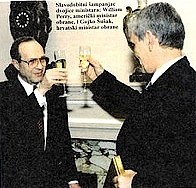 This was the climax of the cooperation between the US and Croatia, which began to develop in 1992 at the beginning of the Serbian-Muslim war. In 1995, Clinton was preparing for his re-election, and Bob Dole was the republic candidate who had requested that Congress remove the arms embargo for the Muslims in BiH. For Clinton, the Balkans became an important issue due to internal matters in the US and his stay in the White House. In their strategy to resolve the crisis, they decided to use Croatia to attack the Serbian forces in BiH, and therefore the Split Declaration was signed by Izetbegović and Tuđman, which permitted the entry of HV forces under the leadership of Ante Gotovina into BiH for the purposes of cooperation with Army BiH. This was the climax of the cooperation between the US and Croatia, which began to develop in 1992 at the beginning of the Serbian-Muslim war. In 1995, Clinton was preparing for his re-election, and Bob Dole was the republic candidate who had requested that Congress remove the arms embargo for the Muslims in BiH. For Clinton, the Balkans became an important issue due to internal matters in the US and his stay in the White House. In their strategy to resolve the crisis, they decided to use Croatia to attack the Serbian forces in BiH, and therefore the Split Declaration was signed by Izetbegović and Tuđman, which permitted the entry of HV forces under the leadership of Ante Gotovina into BiH for the purposes of cooperation with Army BiH. In order to realize that operation, HV had to climb the Dinarid mountains above Knin and liberate the city and Krajina through Operation Storm, and then immediately transfer their troops into BiH in order to pressure the Serbs and force Milošević to sign the Peace Accord in Dayton.
In order to realize that operation, HV had to climb the Dinarid mountains above Knin and liberate the city and Krajina through Operation Storm, and then immediately transfer their troops into BiH in order to pressure the Serbs and force Milošević to sign the Peace Accord in Dayton.This was a battle against the clock for Clinton, for he needed a quick solution to the crisis in order to halt Dole's initiative and to prove himself before his voters as a decisive president who could resolve such great crises such as the one in the former Yugoslavia, the horrors of which were shown daily on CNN and other American TV stations. In order to keep the English and French off his back, Clinton bypassed the classical diplomatic channels, in order to be able to claim that he had not participated if the operation were to go sour. However, considering that the operation, lead by Richard Holbrook on his behalf, ended successfully, but men emphasized their success in their respective books. The first contact at the highest intelligence levels began in 1992, when James Clapper was director of DIA (the Defense Intelligence Agency). His men in Croatia were Colonel Richard Herrick and his assistant Ivan Šarac. Šarac was a fourth order sergeant, the highest rank for a non-commissioned officer. Of Croatian descent, he emigrated to the US when he was 17 years old. After a few years, he enlisted in the army and was sent to Zagreb at the beginning of the war there as he was familiar with the circumstances and knew the language. Colonel Herrick was a construction engineer, however, over time he climbed the ladder in the American military and became one of Clapper's most trusted men. Quickly a sort of 'trade' between the two agencies began. Croatia gave DIA Russian 500 kg underwater mines and the most modern Russian torpedos as well as the cryptic codes used by the Yugoslav Army and the Russian army. These weapons were transferred to the US via the Split airport. When the transport was conducted, the entire airport was closed off. Hercules C-130s landed in the night, the arms were loaded and transferred to the US or one of their European bases under the greatest security measures. Also, the Croatian agency revealed the location of a chemical weapons factory in Bijelo polje near Mostar which the Serbs had transferred to Serbia. | 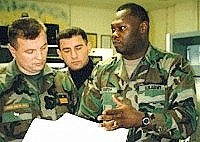 A war photo. General Ante Gotovina is in the middle.
"Because we knew Bosnia's survival was at stake, we had not tightly enforced the arms embargo. As a result, both the Croatians and the Bosnians were able to get some arms, which helped them survive. We had also authorized a private company to use retired US military personnel to improve and train the Croatian army."
Bill Clinton, My Life, Vol II The Presidential Years, p265, 2004, 2005 
"Americans in military uniform, operating from a cream-colored trailor near the runway, directed the GNAT-750 drone to photograph the Serb troop positions and weapons emplacements. The images were transmitted back to base, analyzed and then passed on to the Pentagon. According to top Croat intelligence officials, copies were also sent to the headquarters of the Croatian general in command of 'Operation Storm.' " Newsweek, What Did the CIA Know?, Aug 27, 2001 U.S. envoy Richard Holbrooke referred to the Croatian army as his "junkyard dogs" and acknowledges that the Croatian army was used to inflict substantial losses to the Milosevic-controlled Yugoslav army and shift momentum of the war. Richard Holbrooke, To End A War, 1998 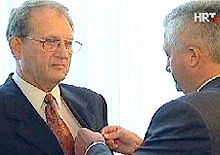
Croatian defense minister Pavao Miljavac (right) decorated MPRI executive director Major General Richard Griffits with the Order of the Croatian Clover in recognition of his contributions to helping Croatia create its own armed forces. 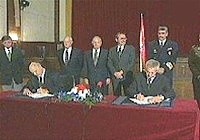 On October 30, 1998 Croatian defense minister Pavao Miljavac and vicepresident of MPRI General Carl E. Vuono signed the Long-range management program (LRMP). |
This was a well covered factory which was unknown even to General Bienefeld, who was the greatest expert for chemical weapons in Croatia. With the help of samples found, the American experts were able to uncover all the types of toxins produced there which had possibly been sold to Iraq or other potential enemies of the US. This was only the beginning of cooperation, by which the US immediately delivered wiretapping equipment aimed at monitoring Serbia and Montenegro, a system which could simultaneously record 20,000 telephone conversations. This cooperation was conducted with the US NSA.
Prior to Storm, the operations Summer 94 and Summer 95 had to be carried out. In planning the operations of bringing Croatian troops above Knin, the US assisted in the intelligence part of the operations. In order to precisely plan the penetration into the Bosnian mountains inland of Knin, much information was needed on the movement of Serbian troops, their communication system, codes and establishment of shelling points. Considering that the US was much more interested in the situation in BiH than in Croatia, they asked Croatia to permit them to install a military base with unmanned aircraft. The basic condition was that this be the best kept secret, so that it would not appear that the US had taken sides in this war. The island of Brac was selected, as it could be well protected. There all the equipment and personnel led by the CIA experts, with the long range unmanned aircraft which could cover the entire territory of BiH to the Serbian corridor on the Sava River. The entire Krajina region in Croatia was also in its range. At that time, no one had any idea what was going on and what was being hidden on the island of Brac. Nor did the US allies, the Germans have any idea. They sent their military attaché there on 1 January 1994. He hired a rent-a-car and drove the outer fence of the base and began taking pictures, thinking that the alertness in the base had faltered on New Year's Day. However, he was quickly spotted by SIS and arrested. Only when he was brought into Gotovina for questioning was it learned that this was the German military attaché in Zagreb, Hans Schwan. After this incident, the entire base was transferred to Šepurina near Zadar, and a triple line of defense placed around it. Equipment was brought in from the US overnight, and from Šepurina, the unmanned aircraft could cover every corner of Krajina and BiH. The Americans had a silent agreement with HV to hand over all the photos of the terrain and the Serbian troops, while the images were transferred via satellite in real time to the Pentagon. Three US and three Croatian officers monitored the situation at all times. Prior to Operation Flash, which was supposed to serve as a dress rehearsal for Storm, at exactly midnight, six hours prior to the beginning of the operation, Herrick and Šarač were called into the police and were informed that the planned action would begin in a few hours time. In the Police Ministry, at exactly midnight, the staff of Operation Flash was formed, which was transferred to the Defense Ministry at 6 a.m. When the staff was moved, the American military attaché moved with it. He constantly requested updates and sent them directly to Clinton in the White House. Each morning, the American President was informed of the preparations and every part of the operation. The Americans were thrilled by the way Flash was carried out, they realized that this model of cooperation with the Croatians was ideal, and could be decisive in the battle against Milošević in BiH and could ultimately result in removing him from power. The Pentagon coordinated the entire action via Richard Herrick, and the CIA activities were coordinated by Marc Kelton, head of the CIA branch in Zagreb, who cooperated closely with Miroslav Tuđman, then head of HIS. 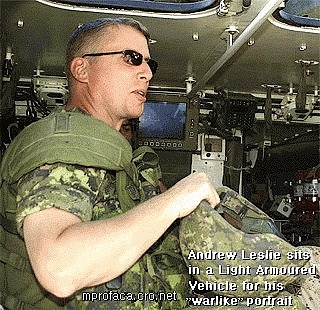
At the time Storm was under preparation, the Americans supplied HV with intelligence on the movements of Serbs in Krajina and the movements of YNA on the eastern borders of Croatia. They feared that Milošević would launch a counter-attack with two tank brigades in eastern Slavonia if the Croats launched an attack on Knin. |
|
In the wee hours of 4 August 1995, the Croatian units were issued the command to turn off all telecommunications devices between midnight and 4 am. Later it was learned that the Americans had used that time to electronically intercept and destroy the Serbian telecommunications devices. HV was left with one hour, from 4-5 am to use their radio ties to coordinate the operation. Just prior to Storm, the American military attaché was again called to the operation staff. Ivan Šarac was again with him. One or two days prior to Storm, Herrick, who had prepared Storm with the Croatian officers and gave the operation the green light on Clinton's behalf, was replaced by Colonel John Sadler. 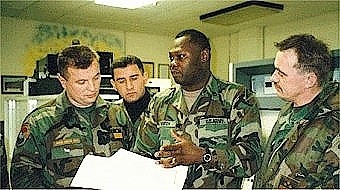 At exactly midnight, they arrived at the operative staff and from there followed all the events in the field. This time, the entire Operation was transmitted in real time via satellite to the Pentagon, where these images remain archived today. The signal transmitted to the signal by the Americans was also received by HV, and with the help of those images, the firing upon Serbian positions and the military base near Knin could be monitored to within millimeters. In addition to electronically destroying the Serbian communications, the US military also acted militarily against the Serbian positions, when it fired on the anti-aircraft battery near Knin from American combat planes that flew over the battle area. That news was released only once, on the 6 o'clock news. Afterwards, the US sharply condemned this, and that news was never repeated. No one believed the official American explanation for the rocket attack, and today the general perception is that this was direct US assistance to HV, only that even ten years after Storm this must not be admitted, due to US-British relations, as Britain had a completely different perspective on how to resolve the Balkan issue. And it still does today. At exactly midnight, they arrived at the operative staff and from there followed all the events in the field. This time, the entire Operation was transmitted in real time via satellite to the Pentagon, where these images remain archived today. The signal transmitted to the signal by the Americans was also received by HV, and with the help of those images, the firing upon Serbian positions and the military base near Knin could be monitored to within millimeters. In addition to electronically destroying the Serbian communications, the US military also acted militarily against the Serbian positions, when it fired on the anti-aircraft battery near Knin from American combat planes that flew over the battle area. That news was released only once, on the 6 o'clock news. Afterwards, the US sharply condemned this, and that news was never repeated. No one believed the official American explanation for the rocket attack, and today the general perception is that this was direct US assistance to HV, only that even ten years after Storm this must not be admitted, due to US-British relations, as Britain had a completely different perspective on how to resolve the Balkan issue. And it still does today.The US was thrilled with the how fast and clean the operation was conducted, and with its outcome, which permitted the lightning fast entry of HV into BiH and penetration all the way to Banja Luka and, finally, Belgrade's consent to sign Dayton. The American control and satisfaction of the complete operation was later confirmed in the statements that the operation was carried out properly, and as such, the US-Croatian cooperation in intelligence and military matters intensified. 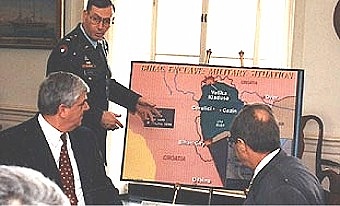 General Colonel Patrick Hughes, Clapper's successor as director of DIA, visited Croatia, intensified cooperation in the sector of electronic monitoring of Serbia and Montenegro, other intelligence was swapped, MPRI began its intensive training of the Croatian military and Rebić was decorated for his efforts. 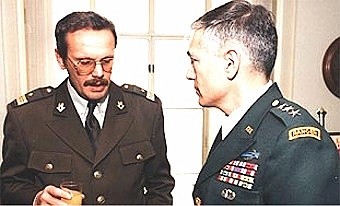 The first word that Croatian officers might have to stand trial for the events during Storm was heard in 1997. The US immediately responded and requested on a dozen occasions in discussions with the Hague Prosecutor that Storm, as a militarily clean operation, be left alone, as Nacional has learned from a high ranking diplomatic source. At that time, there was a problem concerning the extradition of Mladen Naletilić Tuta to the Hague, and the US promised Croatia that the Hague would not raise charges for Storm if they handed Naletilić over. Naletilić was extradited, and Carla Del Ponte outwitted the American administration and began with her demands that the Croatian generals be investigated as suspects in Storm. The US was dismayed but was not allowed to show this, trying to resolve the matter through quiet diplomacy instead, which to this day has not succeeded. Therefore it would be a step in the right direction for the Hague to request that the Pentagon hand over all the images recorded by the 'Predator' unmanned aircraft during and after Storm.
Furthermore, for the interests of truth, all of the high ranking American military and intelligence officers involved in the entire operation, which ended the war in the Balkans and removed Milošević from power, should be called to testify in the Hague. Those responsible for the crimes which took place after the operation are known, and they are the ones which should stand before the court, as they should have eight or nine years ago. Had these men been tried then, Carla Del Ponte today would have no aces up her sleeve, and Croatia would not have the problems is has, with the entire operation proclaimed a 'criminal operation' and the entire state administration of the time a 'criminal organization'. Text Source: Nacional, Croatian weekly (May 24, 2005) | |||||||||||||||||||||
Gotovina Revelations 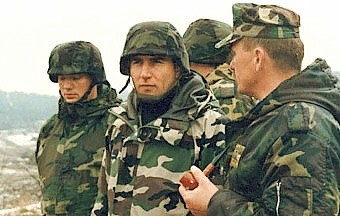 Fugitive general threatens to expose US involvement in the reconquest Fugitive general threatens to expose US involvement in the reconquestof the Krajina. By Dominic Hipkins in Zagreb Photos: Mario Profaca's archive A prominent supporter of Ante Gotovina has revealed the Croatian general indicted for war crimes will try to embarrass the US if he is extradited to The Hague for trial. "If it comes to an arrest, General Gotovina's defence team will call on individuals from the United States to testify," said a friend of the controversial former army commander, Nenad Ivankovic, who is head of the right-wing organisation HONOS, the Association for the Protection of the Values of the Homeland War. 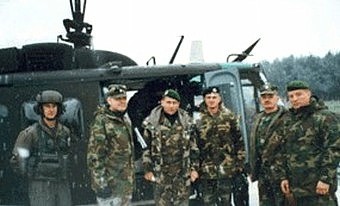 The general's supporters believe the move will reveal the extent of US involvement in Operation Storm, the Croatian army's successful campaign against the Serb-held Krajina region in 1995. Washington has always denied claims that it gave the "green light" for Croatia to overrun the UN-protected area. The general's supporters believe the move will reveal the extent of US involvement in Operation Storm, the Croatian army's successful campaign against the Serb-held Krajina region in 1995. Washington has always denied claims that it gave the "green light" for Croatia to overrun the UN-protected area.Several hundred Serb civilians were murdered, or disappeared, in the aftermath of the operation. Some 200,000 fled to neighbouring Bosnia and Yugoslavia. An orgy of house-burning left much of the area a charred wasteland. A tribunal indictment made public in July held Gotovina responsible for these crimes. He promptly went underground. Ivankovic, editor of the daily newspaper Vjesnik during the Tuđman era, claims he was one of the last to see Gotovina and that the general authorised him to speak on his behalf. 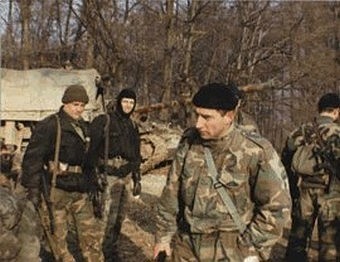 Apparently sensing that The Hague's net was closing in last spring, Gotovina took his ally to an old military base near Zadar, in Dalmatia, to tell him about US intelligence ties with Croatia on the eve of Operation Storm. Apparently sensing that The Hague's net was closing in last spring, Gotovina took his ally to an old military base near Zadar, in Dalmatia, to tell him about US intelligence ties with Croatia on the eve of Operation Storm.The base was allegedly used by US operatives to collect military data from unmanned pilotless aircraft, or drones, which was then passed on to the Croats. "Gotovina told me this was an important base for the US, because it replaced their operations on Brac [an Adriatic island] after the [Split-based] Feral Tribune newspaper discovered it," Ivankovic said. The author of a bestselling biography about Gotovina, Ivanković says the general told him the US knew exactly what the Croats were up to. "He (Gotovina) feels betrayed by the silence of the US today and by the people he knew. The CIA saw everything that happened during Operation Storm, and never objected then," said Ivanković. He has also produced photographs that suggested the general was working closely with the Americans in the run up to the invasion of Krajina. 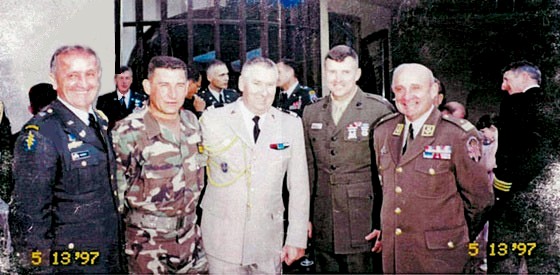 One, published in Jutarnji List, shows Gotovina alongside a man identified as Ivan Šarac, a former deputy defence attache at the US embassy. Allegedly taken several days before the military campaign, the pair are shown posing in the Dinaric mountains above the former rebel stronghold of Knin, with a man in an American army uniform. In other photographic evidence handed to IWPR, Gotovina, wearing translation earphones, is seen sitting in front of a computer screen titled "Battle Staff Training Program". Another shot pictures him underneath a sign stating " Welcome to Training Center Fort Irwin". 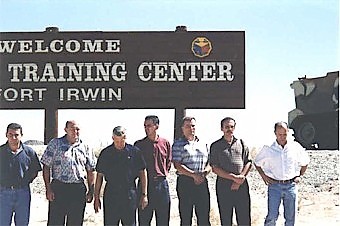 Gotovina's supporters say two prominent US diplomats, Peter Galbraith and Richard Holbrooke, should be allowed to testify if the general eventually stands trial, as they could prove that he fought a clean war and reveal the extent of American involvement in the conflict. Gotovina enjoyed close contact with Galbraith, the former US ambassador to Zagreb, and believes he could confirm that the general had observed the rules of war during Operation Storm. Gotovina's supporters say two prominent US diplomats, Peter Galbraith and Richard Holbrooke, should be allowed to testify if the general eventually stands trial, as they could prove that he fought a clean war and reveal the extent of American involvement in the conflict. Gotovina enjoyed close contact with Galbraith, the former US ambassador to Zagreb, and believes he could confirm that the general had observed the rules of war during Operation Storm.Holbrooke, the former US Balkans envoy, recorded in his memoirs that he successfully exerted pressure on Croatian units inside Bosnia to halt their advance on the Serb stronghold of Banja Luka, in 1995. Gotovina's supporters say that this would support their theory that the US played an influential role in the reconquest of Krajina. The former BBC Balkans correspondent-turned British MP, Martin Bell, has said it is vitally important that witnesses such as Galbraith and Holbrooke are called in the event of Gotovina being tried. "The general's liberty is at stake so he should be able to call on whoever can aid his defence," said Bell. 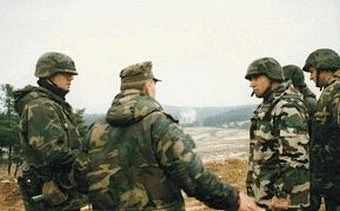 Meanwhile, in Croatia, there's widespread criticism of the Gotovina indictment across the political spectrum, as Operation Storm is generally viewed here as the victorious finale to a hard-fought independence struggle. Meanwhile, in Croatia, there's widespread criticism of the Gotovina indictment across the political spectrum, as Operation Storm is generally viewed here as the victorious finale to a hard-fought independence struggle.Many reject The Hague's assertions, in the indictment, that Gotovina's forces engaged in ethnic cleansing during the capture of the Krajina region. "Something like this (ethnic cleansing) cannot be true," Prime Minister Ivica Racan told a crisis session of parliament in July. There's a widespread view that if Gotovina is prosecuted, the American role in the campaign should be investigated. "This is more important than one man's guilt or innocence," said Zvonimir Cicak, founder of the Helsinki Committee for Human Rights in Croatia. More details of Gotovina's international connections seem certain to emerge. And if and when the general faces the Dutch court, he may not be alone in the dock - American foreign policy in the Balkans could face cross-examination there, too. Source: IWPR, Balkan Crisis Report (BCR No. 288, October 16, 2001) 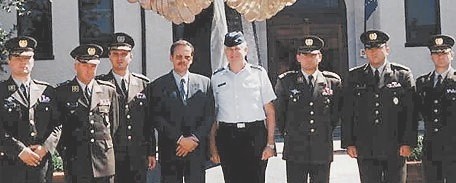 |
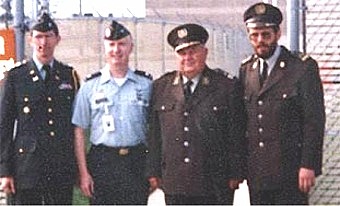 War crimes tribunal drops charges against Croatian general
War crimes tribunal drops charges against Croatian general Janko Bobetko By Keith Lee and Paul Mitchell 26 February 2003 The International Criminal Tribunal for the Former Yugoslavia (ICTY) has dropped war crime charges against the former Chief of the Croatian Army, General Janko Bobetko. | |
|
Medical experts appointed by the tribunal have declared the 83-year-old Bobetko too ill to stand trial. Bobetko was the most recent of a number of top ranking Croatian military officers to be accused of war crimes during the Homeland War. This conflict erupted soon after Croatia declared independence from Yugoslavia in June 1991 and the Serb majority in the Croatian Krajina region responded by establishing an independent Serb Republic. As the war escalated the United Nations sent peacekeeping troops into the Krajina in February 1992. The following year Croatian Army units attacked an area close to the UN patrolled area called the Medak Pocket. Canadian UN troops reported how the Croatian Army laid waste to the area killing unarmed Serb civilians. In May 2001 the ICTY indicted General Rahim Ademi, commander of the Medak Pocket troops, with unlawful killing of at least 38 Serb civilians and the destruction of hundreds of buildings. Late in 2002 the ICTY charged Bobetko with "command responsibility" for the attack. In his autobiography All My Battles Bobetko boasts of his role in the Medak Pocket as proof of his military ingenuity. The indictment points, however, that the most intense killing and destruction took place after a ceasefire had been agreed. The ICTY has also charged another Croatian general, Ante Gotovina, with "command responsibility" for war crimes committed during the August 1995 Croatian offensive code-named Operation Oluja (Storm) which recaptured the Krajina and led to the biggest single act of ethnic cleansing in the Yugoslav civil war. Between 150,000-200,000 Krajina Serbs were displaced, about 150 murdered and hundreds more disappeared. The indictments have caused a political crisis in Croatia because they question the claim that the Homeland War was a progressive war of liberation and undermine the Western powers' claim that the Balkan conflict was entirely the product of former Yugoslav President Slobodan Milosevic's drive for a Greater Serbia. The atrocities detailed in the indictments show that the upper echelons of the Croatian military promoted a brand of nationalism every bit as reactionary as Milosevic's Serbian nationalism; one that glorifies the Nazi puppet regime in Croatia during the 1940s and speaks of regaining Western Bosnia. The crimes committed during the Homeland War were never investigated during the ten years that President Franjo Tudjman's Croatian Democratic Union (HDZ) governed Croatia after its separation from Yugoslavia. Following threats to stop an International Monetary Fund loan, the HDZ did pass a law on cooperation with the ICTY and handed over ten Bosnian Croats accused of war crimes in Bosnia in 1997. However the HDZ regarded those involved in the Homeland War as untouchable heroes. When HDZ rule collapsed in January 2000, the Western powers claimed the new coalition government led by Ivica Racan's Social Democratic Party (a successor to the former Communist Party) heralded a break with the extreme nationalism of the Tudjman era and that it would agree to Croatian war crimes investigations. These investigations were particularly necessary to bolster the new and fragile pro-Western Serbian government that was faced with a crisis over its decision to hand over Milosevic to the ICTY. After meeting Croatian officials, ICTY Chief Prosecutor Carla del Ponte declared, "The whole tone is different... Finally we have a partner in the Balkans and not just another problem." However, the indictments caused severe difficulties in Croatia. In 2000, the HDZ organised massive demonstrations and blockaded the Zagreb-Split highway after the indictment of General Mirko Norac for war crimes committed in 1991. Twelve generals, including Bobetko, signed an open letter criticising Racan's attempts to "devalue" the Homeland War, sparking off rumours of a coup. In July 2001, four ministers in Racan's government belonging to the Social Liberal Party resigned after Gotovina and Ademi were indicted causing a vote of no confidence to be taken in the Croatian Assembly. By the time of her appearance at the UN Security Council last year, del Ponte appeared exasperated. "In June 2001 ... as an expression of trust, I gave the Croatian Government advanced notice of a sealed indictment against General Ante Gotovina, a commander of forces who was accused of crimes against humanity. My trust was misplaced—he was allowed to evade arrest and according to various reliable sources he is now enjoying a safe haven in the territory of Croatia," she said. Del Ponte continued, "In May this year I again provided the Croatian authorities with advanced notice of an imminent indictment against General Bobetko, former Chief of Staff of the Croatian Army.... Instead of compliance with the Tribunal's order, the Croatian Government has taken upon itself to seek to challenge the warrant and the indictment itself. We next heard that the General's health does not permit his travel to The Hague. More delay and obstruction. The attitude of Croatia is unacceptable." With unemployment in Croatia over 20 percent and public expenditure more than 50 percent of GDP—the highest in Europe—the government has speeded up the HDZ programme of privatisations, layoffs and reductions in welfare. Croatia's has joined the World Trade Organisation and applied for membership of NATO and the European Union. To head off the widespread strike action these policies are provoking the government is playing the nationalist card. In June 2001 Racan announced plans to erect a huge monument to the Homeland War saying "At this time of difficult decisions and self-sacrifice ... we should remember and be inspired by the strong unity of the Homeland War ... [when] ... there was no left, no right, there were no political, social, cultural or other differences." Racan is no stranger to the use of nationalism to divert the working class. A former Stalinist bureaucrat like Milosevic, he was elected president of the ruling Croatian Communist Party in 1989 and played a key role in the break up of the Yugoslav federation. In 1990 he clashed with Milosevic, declaring that Croatia would no longer "provide bread to Serbia" and organised the first multi-party elections specifically to approve his separatist line. | Racan defends the Medak Pocket attack as a "legitimate military operation" and states that Bobetko performed his "constitutional duty to liberate Croatian territory" and so cannot be considered guilty of "command responsibility". However, he is happy to accuse Milosevic of "command responsibility" for Serbian atrocities and sanctioned Croatian President Stipe Mesic's appearance as a witness for the prosecution at Milosevic's trial. For his part, Milosevic claims the atrocities were also individual acts of violence that occurred whilst he was trying to preserve the Yugoslav federation and its constitution. The case has highlighted divisions between Europe and the United States. Recently US Ambassador for War Crimes, Pierre-Richard Prosper, told the ICTY it should focus on the arrest of four remaining key suspects and then halt its investigations and hand over existing cases to local courts. Prosper said that during a visit to the Balkans he would aim to "press" the governments in Serbia, Bosnia, and Croatia to arrest all remaining fugitives, but he cancelled his visit to Croatia at the last minute as a slap in the face to del Ponte and her efforts to indict the Croatian generals. The US has reason to be concerned at a high profile trial of the generals. The Croatian army acted as Washington's proxy army against Milosevic and there is plenty of evidence that the Clinton administration provided vital support to Croatia during Operation Storm. In his book To End A War, Clinton's special envoy Richard Holbrooke described the Croat forces as his "junkyard dogs" and recounts his conversation with the Croatian defence minister during the battle, saying, "We can't say this publicly but please take Sanski Most, Prijedor and Bosanki Novi. And do it quickly before the Serbs regroup." The US government endorsed a contract between the Croatian army and the US military consultancy firm Military Professional Resource Incorporated to provide military training. Franjo Tudjman's son Miroslav, who was head of Croatian intelligence at the time, claims the relationship went further with the Croatian and US governments enjoying a "de facto partnership". He says the US provided $10 million worth of listening and intercept equipment and all "intelligence in Croatia went on line in real time to the National Security Agency in Washington." Gotovina seemed especially close to US officials, which may explain his ability to evade capture for so long. It is alleged that US drone aircraft operated out of his headquarters in order to spy on Yugoslav army movements. Photographs show Gotovina with US military personnel in front of a computer screen showing "Battle Staff Training Program" and "Welcome to Training Center Fort Irwin". According to Nenad Ivankovic, former army commander and Gotovina's biographer, Gotovina "feels betrayed by the silence of the US today and by the people he knew. The CIA saw everything that happened during Operation Storm and never objected then." Washington has refused all requests from the ICTY for documents and satellite photographs relating to this period. Another concern of US officials is to prevent the concept of "command responsibility" becoming a definition for war crimes. Lawyers for the Croat generals have pointed out that Clinton, Holbrooke and other US officials could also be charged with command responsibility for Operation Storm because "they knew the attack was coming and gave it the green light." This threat is taken seriously. In 2002 Henry Hyde chairman of the House Committee on International Relations warned that the ICTY could investigate officials who were "formulating and carrying out US government policy" for command responsibility in connection with Operation Storm. Gotovina's indictment was the "best example of the ICTY's politicised and inaccurate prosecution," a Senate inquiry was told. In a series of articles in September 2002, journalists in the Washington Times repeated Hyde's warning and attacked the concept of command responsibility as "a threat to US national interests". In effect, the Times pronounced, the concept made "war itself a crime" and illegalised the use of "overwhelming force", that is, the foundation of US military strategy. The Times pointed out that Operation Storm was the model for Operation Enduring Freedom in Afghanistan, where the Northern Alliance acted as a US proxy army. If command responsibility is made a definition of a war crime then "the United States can be made accountable for the actions of its allies around the world. There will be nothing preventing the International Criminal Court from making US officials responsible for isolated criminal acts that have been committed by Northern Alliance troops." The Operation Storm indictment, the Times concluded, "threatens to limit Washington's ability to project its power around the world." SEE ALSO:  General Gotovina's Staff meeting held in Knin, August 6, 1995, after Operation Storm General Gotovina's Staff meeting held in Knin, August 6, 1995, after Operation Storm General Gotovina boarding plane after the arrest on December 7, 2005 in Tenerife General Gotovina boarding plane after the arrest on December 7, 2005 in Tenerife Implementing Dayton: Arms Control Implementing Dayton: Arms Controland Intelligence in Former Yugoslavia By Sami Fournier, Tasos Kokkinides, Daniel Plesch, and Richard Thomas  How the CIA intercepted SAS signals How the CIA intercepted SAS signalsUS intelligence was involved in a fierce backstage struggle with its 'reluctant' allies at the height of the conflict, writes Ed Vulliamy. The Guardian January 29, 1996 |
 Croat Generals On Trial
Croat Generals On Trial
 1
1

